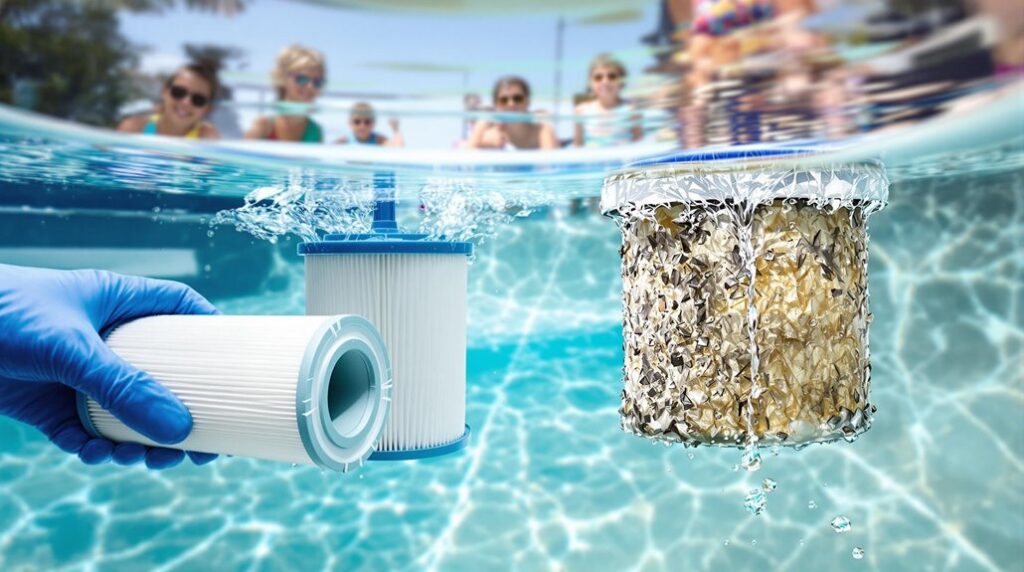Your pool filter’s lifespan hinges on three key factors: consistent pressure management, proper maintenance schedules, and balanced water chemistry. Regular backwashing as pressure rises 5-6 PSI above baseline, cleaning cartridges every 2-4 weeks, and maintaining pH levels between 7.2-7.6 can extend your filter’s life by up to 50%. Regional conditions such as hard water and humidity affect longevity, but understanding these fundamentals will help protect your investment and guarantee crystal-clear water for years to come.
Understanding Your Filter’s Lifespan: Hard Facts and Regional Factors

While your pool filter’s lifespan depends largely on its type, several important factors can either extend or reduce its operational life. Sand and DE filters typically last 5-7 years, while cartridge filters run 2-5 years, though real-world performance often falls 20% short of manufacturer claims.
Your location plays a vital role in filter longevity. If you’re in hard water regions such as Arizona or Texas, expect your filter’s lifespan to be cut in half compared to soft-water areas. In the same way, Florida’s humidity and frequent storms can reduce a filter’s life to 2-3 years, while the same filter might last 6+ years in Minnesota. Don’t be surprised if your manufacturer’s warranty seems optimistic – environmental conditions and regional factors greatly impact how long your filter will actually serve you.
The Art of Pressure Management and Backwashing
Understanding your filter’s lifespan sets the foundation, but proper pressure management often determines how well that filter performs daily. Your system’s pressure gauge serves as a critical diagnostic tool, helping you maintain ideal performance and prevent costly breakdowns. Maintaining pool water safety requires consistent monitoring throughout all seasons. Regular heater inspection helps ensure optimal pool temperatures while preventing strain on your filtration system. Chemical balance testing helps identify issues before they affect filter performance. Pool shock treatments can help extend filter life by preventing algae buildup and contamination.
Maintaining proper filter pressure isn’t just about longevity – it’s the key to peak performance and avoiding expensive system failures.
Here’s what you need to monitor for pressure management success:
- Track your baseline pressure (10-12 PSI for most systems) and watch for increases of 5-6 PSI, which signal backwashing time
- Extend backwash duration until water runs clear, followed by a 2-minute rinse cycle
- Install variable speed pumps to reduce wear while maintaining proper flow rates
- Check for air leaks and clogged o-rings that can trap air in filter tanks
Regular pump motor inspection helps identify early warning signs of mechanical failure before they impact filter performance.
Essential Maintenance Practices That Add Years to Your Filter

A well-maintained pool filter can last several years beyond its expected lifespan if you follow proper maintenance practices. Start by establishing a seasonal maintenance routine: inspect equipment in spring, clean regularly during summer, control debris in fall, and provide winter protection.
You’ll need to rinse cartridges every 2-4 weeks with a garden hose, and perform deep cleaning 1-2 times annually using specialized solutions. For persistent buildup, soak cartridges overnight. Monitor pressure levels closely – as they rise 8-10 psi above normal, it’s time to clean. Check for damage during each maintenance session, paying special attention to O-rings, seals, and connections. Replace cartridges every 1-2 years, sand media every 3-5 years, and D.E. grids annually. Don’t forget to lubricate seals and verify pump connections regularly.
Water Chemistry: The Hidden Key to Filter Longevity
Proper water chemistry stands near the cornerstone of extending your pool filter’s life, yet many owners overlook this essential aspect of maintenance. Chemical imbalances directly affect how quickly your filter wears down, particularly as pH levels swing excessively far in either direction. Cloudy water conditions can rapidly clog filter media and reduce its effectiveness if left untreated. Algae prevention is crucial since these organisms can quickly overwhelm even well-maintained filters. Regular maintenance tips help ensure your pool stays crystal clear while protecting filtration systems. Summer preparation begins with a thorough inspection of your filter system to ensure optimal performance.
To maintain ideal chemical balance and protect your filter:
- Test pH levels weekly, adjusting to maintain between 7.2 and 7.6
- Monitor total alkalinity to prevent rapid pH fluctuations
- Keep chlorine levels consistent to prevent organic buildup in the filter
- Balance calcium hardness to prevent scaling and mineral deposits
Understanding these chemical relationships isn’t just about water clarity – it’s about protecting your investment. Whenever you maintain proper chemistry, you’re actively preventing premature wear on your filter media and extending its operational lifespan. Regular testing with a pH testing kit helps ensure your water stays perfectly balanced for optimal filter performance.
Frequently Asked Questions
Can I Run My Pool Filter System for Fewer Hours to Extend Life?
Run filter 8-10 hours daily. Shorter runs harm equipment and water quality.
What Happens if I Mix Different Types of Filter Media?
Mixing filter media types reduces filtration efficiency. Different particle sizes create uneven gaps, allowing contaminants to bypass the filter. Use single media type only.
Should I Replace My Filter if the Pump Motor Dies?
Replace both filter and pump motor. Old clogged filter can damage new motor.
Does Swimming Pool Salt System Affect Filter Longevity?
Salt systems do not reduce filter longevity when properly maintained. Filters may last longer due to consistent chlorine levels and fewer chemical additives.
Can Extreme Weather Conditions Permanently Damage My Pool Filter System?
Yes. Extreme weather can damage filters through freezing, debris clogs, and heat stress. Prevention requires winterization, storm preparation, and maintenance.

